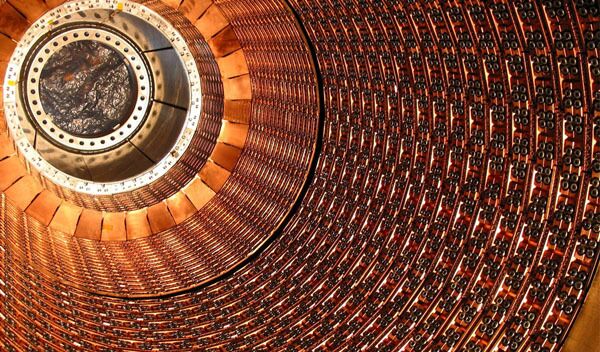MOSCOW, September 9 (RIA Novosti) - The Large Hadron Collider (LHC) could be useful in the research of processes taking place on the Sun, Russian physicists from the Joint Institute for Nuclear Research said.
Sergei Karpov and colleagues proposed using ATLAS - one of the collider's detectors - for studying mysterious muonic bursts registered by the Baksan Underground Scintillation Telescope in the Caucasus in 1981-2006.
"The nature of these muon bursts and their relation to solar cosmic rays have so far remained not quite clear. The ATLAS detector possesses an excellent muon system that allows searches for similar muon bursts," the scientists said in an article published in the Physics of Atomic Nuclei magazine.
The ATLAS detector is one of the LHC's main detectors and is capable of tracking any processes emerging as a result of elementary particle collisions in the collider.
The collider, located 100 meters under the French-Swiss border with a circumference of 27 km, enables scientists to shoot sub-atomic particles round an accelerator ring at almost the speed of light, channeled by powerful fields produced by superconducting magnets.
In order to fire beams of protons round the vast underground circular device, the entire ring must be cooled by liquid helium to minus 271 degrees Celsius, just two degrees above absolute zero.
By colliding particles in front of immensely powerful detectors, scientists hope to detect the Higgs boson, nicknamed the "God particle," which was hypothesized in the 1960s to explain how particles acquire mass. Discovering the particle could explain how matter appeared in the split-second after the Big Bang.
The international LHC project has involved more than 2,000 physicists from hundreds of universities and laboratories in 34 countries since 1984. Over 700 Russian physicists from 12 research institutes have taken part.
The European Organization for Nuclear Research (CERN) said in August that the cost of repairing the LHC, which has been out of operation since last September, will be $37.7 million.
The construction of the collider took around 20 years and cost $4.9 billion.
Experiments using the particle accelerator were suspended due to a helium leak into the tunnel housing the device and a subsequent electrical fault.



